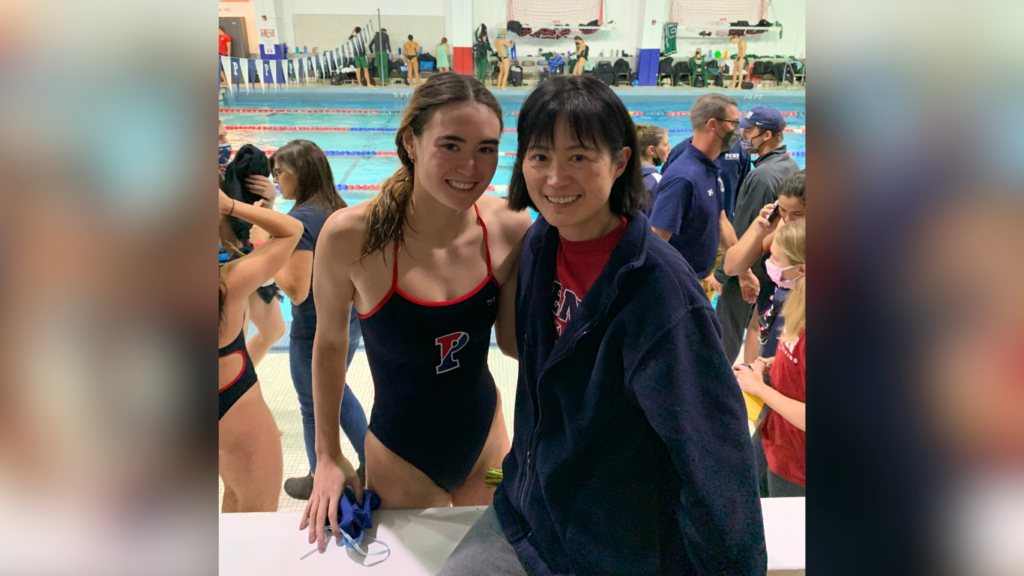Raised by a Taiwanese mother and an Irish American father, Paula Scanlan was taught from a young age to not draw attention to negativity. In Asian cultures, she explained, though it may sound stereotypical, everything you do should be scrutinized under the lens of being honorable to your family. That meant that her family expected her to go to a good school, get a good job, and be a successful young woman.
Scanlan never intended to go against the grain, attending the University of Pennsylvania, where she studied computer science and swam for the school’s prestigious NCAA Division 1 swim team. She was the only female athlete at UPenn’s engineering school in the class of 2022 and would later go on to work for a New York City financial technology company.

While her life was seemingly set on a methodically-calculated trajectory, it shifted dramatically after her school’s decision to allow trans-identifying swimmer Lia Thomas to compete on the women’s team and change in the women’s locker room. Scanlan could no longer be silent.
‘I Understood Going Through Something That Was Unjust’
Many red flags were raised for Scanlan when Thomas joined her team. The concept of sharing a locker room with a biological male was already troubling enough, as is the case for many women and girls who have shared their stories with Independent Women’s Forum (IWF). But it was especially so for Scanlan, who had joined UPenn’s swim team to heal emotionally after she was sexually assaulted in a bathroom at the age of 16.
“I woke up the next morning, and it was like everything had changed and I was just forced to grow up basically in one day,” Scanlan said, recalling the assault. She shared that as time went on, things did get easier, but since she was only 16, she hadn’t had much experience with intimate relationships, and the choice to consent was taken away from her. She continued:
“In a lot of ways, my experience of being assaulted helped me see very quickly what was so wrong about having to undress in front of and be teammates with a male. It opened me up to seeing this situation on my swim team for what it was—I understood going through something that was unjust, I understood the feeling of your voice being drowned out by a million people.”

The University of Pennsylvania, however, appeared to be anything but sympathetic to Scanlan’s feelings as a sexual assault survivor. In fact, University employees dismissed the concerns of female athletes by attempting to “re-educate” the swimmers to lower their guard, Scanlan explained, and become more comfortable sharing previously sex-segregated spaces with members of the opposite sex.
Scanlan refused to fake feeling comfortable with having her safety and privacy encroached upon at the behest of progressive gender ideology. Before the 2022 season ended, Scanlan opened up to several swimmers on her team about how Thomas’s presence affected her emotionally. She also participated in some anonymous interviews with news sources.
With her identity concealed, she appeared in the Daily Wire documentary “What Is A Woman” to speak out about how her school’s athletic department was attempting to silence dissent. Despite her remaining anonymous, hostile interactions among team members increased to the point that Scanlan often received messages slandering her as a homophobe, transphobe, and a bigot.
“They would just throw those words at me, and I would say, ‘I’m really happy to continue this conversation in person.’ I think texts can misconstrue things very easily,” Scanlan said, sharing that all but three girls on her team appeared eager to burn bridges over the polarizing issue of biological males in female-specific spaces.
“But they would just ghost me or ignore me and just walk away if I was in the same room, or if I was in their lane at practice, they would move.”
‘This Is Not Hypothetical, This Is Real’
There was a lot at stake when Scanlan mulled over going public. She explained that some of her teammates have been supportive, as have several athletes on the men’s team. But Scanlan worried about widespread isolation among her larger group of Gen Z peers. After all, her generation is not only the most likely to identify as LGBTQ+ but is also the most likely to isolate others based on mismatched political views.

But as Thomas began winning titles, Scanlan couldn’t allow the UPenn athletic department’s psychological manipulation to go unnoticed. Her university may have sought to erase common-sense principles, but Scanlan told IWF that, in her heart, she knew that going public was the right thing to do.
On July 27, 2023, without her identity concealed, Scanlan dropped a proverbial “bomb” on Congress (as fellow female athlete and outspoken voice on the matter Riley Gaines put it). Scanlan, addressing members of the House Judiciary Committee’s Subcommittee on the Constitution and Limited Government, explained just how much of a sacrifice she made to dedicate her life to competitive swimming, beginning at just eight years old.
She pointed out that she “gave up countless Christmas holidays, weekends, and social events,” so that she could practice 20 hours each week and eventually swim on a Division 1 team. According to Scanlan, it was a dream come true when she was invited to swim for UPenn. Though she hadn’t become an NCAA champion, her athletic prowess was documented in history when she broke the New England Independent School League Record in March 2017 for the 400-yard freestyle relay.
Both from the perspective of a young woman who had sacrificed much of her youth to compete at a high level, and as a STEM student determined to uphold scientific truth, Scanlan would not stand for the presence of Thomas, a biological male, on her team. She recalled before Congress how her university invalidated her feelings and silenced her dissenting viewpoints from the progressive hegemony.

“This is not hypothetical, this is real,” Scanlan said during her testimony, urging members of Congress to consider the eradication of womanhood a bipartisan issue. “I know women who have lost roster spots and spots on the podium. I know of women with sexual trauma who are adversely impacted by having biological males in their locker room without their consent.” Scanlan admitted to lawmakers that she was one of those women, being a survivor of sexual assault.
Now an IW spokeswoman [as of July 2024, Scanlan is now serving as Legislative Liaison for IW], Scanlan has spread her message at IWF’s “Our Bodies, Our Sports” Rallies in Tennessee and Illinois, signed onto IWF’s “Keep Women’s Sports Female” Open Letter to government officials, policymakers, and athletic associations and governing bodies, and was present for the introduction of a Congressional resolution establishing National Women’s Sports Week in Washington, D.C.
On August 7, 2023, Scanlan, Gaines, and several other activists had the opportunity to sit alongside Texas Governor Greg Abbott as he signed the “Save Women’s Sports Act” bill at Texas Woman’s University in Denton. This bill, also known as SB 15, is a piece of legislation specifically designed to protect women’s sports at Texas colleges and universities by preventing biological men from competing against women.

‘Everything You Say Is Scrutinized’
Ever since going public and becoming an IW spokeswoman, her social following on platforms like X (formerly Twitter) continues to grow by the tens of thousands. She explained that the increased exposure has been difficult to navigate since any thoughts she puts out online are scrutinized and subjected to widespread internet discourse.
“I just open my phone and there are hundreds of hate messages and fighting and it’s not even always directed at me. Sometimes I’ll just be tagged in the chain of somebody arguing with another person,” she said. “But it’s like you’re still implicated in it because you have to read it and there’s just a lot of negativity coming in. People kind of go to Twitter to post negativity.”
Social media is well documented as negatively affecting mental health, but for a young woman like Scanlan, who is calling attention to otherwise underreported or silenced perspectives, the digital public square serves as a vehicle for empowerment and truth. Scanlan said that she has developed a personal filtration system to cull through the hate and remain open to genuine constructive criticism.
“My easiest tell is if any negative comment contains the word ‘transphobic,’ ‘bigotry,’ ‘white supremacy,’ or any of those types of words—if that’s anywhere in the response—I kind of ignore it because I know that there’s nothing valid,” she explained. “Those are polarizing words that people kind of just throw out at anyone [who] disagrees with them.”
Scanlan additionally maintains mental clarity and a positive focus by focusing on the support she has received and her desire to serve as a role model for young female athletes. Scanlan stated that people from all walks of life have approached her with heartwarming, passionate encouragement – including fellow NCAA athletes.
Unconditional love from her family has also helped Scanlan protect her well-being. Although her brother is eight years older than she is, the two have a close-knit bond. When Scanlan’s parents warned her against speaking out on the off chance that it would, in her mom’s eyes, taint the family’s name and threaten her daughter’s future employment, Scanlan’s brother helped talk her through the decision at hand.

Scanlan said he continues to be one of her closest confidants, no more than a text away, and is happy to spend hours with his sister watching and rewatching some of her favorite shows like “Make It or Break It” or “Gossip Girl.”
“I texted my brother exactly this last night: ‘I don’t think I’m meant to be a public figure. I think I should retire into oblivion,’” Scanlan told IWF. “My brother responds and sends me a link to an article describing what imposter syndrome is. I said, ‘no, that’s different. I’m not doubting my skills or accomplishments. I’m just not meant to be public.’ I feel that way, but then I go to bed and I wake up the next morning and I go do an interview, and I’m like, no, this is so empowering, this is so great.”
Scanlan said her brother has helped her identify how she can improve her work-life balance since before she went public, going on social media was simply an after-work activity. After all, she was on track to continue in the corporate world, working at a company employing roughly one thousand people. She never imagined that her activism would lead to a full career, but now feels excited by the many opportunities to make a difference in legislation to protect women’s sports and women’s spaces.
“I want everyone to just be able to speak their truth, even if it doesn’t involve being on a high-profile stage. It shouldn’t require a controversy for you to have to speak out. You should just be able to do that freely,” Scanlan said.
‘I’m Going To Speak My Mind’
Given the internet’s attention economy, she pointed out how some people may try to capitalize on controversy, stir the pot, and preach empty platitudes. But for Scanlan, this movement is not about clout. This movement is about setting the record straight and restoring fairness and common sense for female athletes who just want to play their sports.

Now a college graduate and in the “real world,” Scanlan finds it important to decompress regularly from the 24/7 news cycle, which, if not properly managed, can and does easily deplete a person’s mental bandwidth. Not swimming competitively anymore, Scanlan no longer has both morning and afternoon practice for full-body, intensive regimens, and instead motivates herself to exercise on her own time.
Scanlan said that everything is much lower stakes and she usually opts for running. Before she hops on work calls, freshly fueled by coffee and a homemade baked good (a stress-busting passion of hers), Scanlan is no stranger to waking up early and running 13 miles by the shore.
In fact, Scanlan and her childhood friends were recently training for a marathon, but she maintains that her athletic focus is more for fun instead of a goal, trophy, or best time at a meet. Staying healthy and uninjured is top of mind, and Scanlan said that if she misses a run, she’ll try to get in a brisk walk to stay active.
Physical fitness is still an important part of Scanlan’s everyday lifestyle, giving her the confidence to boldly advocate for her cause and serving as the fundamental reason behind the cause itself. No matter where her future lies after graduating, leaving UPenn’s swim team, and now becoming a spokeswoman at IW, Scanlan is determined to do work she feels passionate about and to unapologetically speak the truth.










